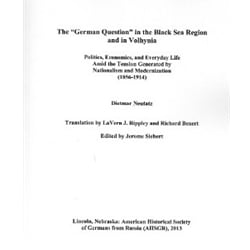
The ‘German Question’ in the Black Sea Region and in Volhynia
The ‘German Question’ in the Black Sea Region and in Volhynia
The ‘German Question’ in the Black Sea Region and in Volhynia Politics, Economics, and Every Life Amid the Tension Generated by Nationalism and Modernization (1856-1914)
by Dietmar Neutatz
Translated by Lavern Rippley
Lincoln, Nebraska
2013
481 Pages
Paperback
The American Historical Society of Germans from Russia International (AHSGR) is pleased to bring this English translation of a key scholarly work by Dietmar Neutatz to the attention of its members and others who are interested in the history of the Germans who settled in the Russian Empire, first in the Volga region under the manifest issued by Catherine the Great, later in the Black Sea area by permission of her successors, and finally under private initiative in the western and southwestern provinces. The book covers a key period in German Russian history that involves the second half of the nineteenth century, as well as the first two decades of the twentieth century when Russian public discussion focused on the German colonists in the south and southwestern Russian empire and explores examples of the problems faced by ethnic, religious, and social minorities, when nationalism and economic difficulties occur. The issue is of particular interest currently, given the context of today’s revival of nationalistic antagonisms in eastern and southeastern Europe. While the setting of the book takes place in the Black Sea region and Volhynia, the examples cited also have relevance to other German settlements in the Russian empire such as the Volga region. The author has done an exceptional job in not only documenting and referencing his sources, but also in providing an extensive bibliography and sources of research materials. The endeavor of translating the book was launched by Dr. Richard Benert, who discovered the book, quite by chance, in the library of the Institut für Auslandsbeziehungen in Stuttgart, and immediately began hoping that it might someday be made accessible to American readers. It was evident that between its covers lay a vast amount of information for scholars, who are all too often only dimly aware of Russia’s Germans in this time period, and for the many descendants of those ethnic Germans whose minds are filled with questions about how their ancestors lived, how they got along with their non-German neighbors, and why the Russian government seemingly reneged on its “promises” and undertook policies seemingly designed to eradicate this “German threat.” Evident also was the fact that Dietmar Neutatz’s answers to these questions would be both enlightening and, in some cases, surprising. It would present a challenge to a number of established beliefs, but it would also give us a more well-rounded, comprehensive view of the subject than anything hitherto published.
$40Members save $10.00!
Become a member
77 in stock
